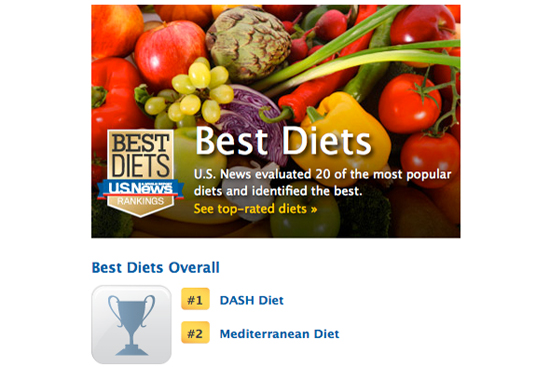US News & World Report: DASH Diet Number One, BU-created plan tops magazine’s list
Want the inside scoop on dieting? Ask BU’s Thomas Moore. The Medical Campus associate provost helped create the best diet plan going, according to US News & World Report.
 DASH (Dietary Approaches to Stop Hypertension) topped 19 other diet plans in the magazine’s “Best Diets Overall” category, beating out such popular plans as Atkins, Jenny Craig, and Slim-Fast. The accolade is eye-catching for two reasons: DASH hasn’t been commercially marketed like those other plans—you don’t “see it at halftime during the football game,” notes Moore, a School of Medicine professor. And it wasn’t even designed to shrink waistlines. Rather, it’s a doctor-devised regimen to help people lower high blood pressure.
DASH (Dietary Approaches to Stop Hypertension) topped 19 other diet plans in the magazine’s “Best Diets Overall” category, beating out such popular plans as Atkins, Jenny Craig, and Slim-Fast. The accolade is eye-catching for two reasons: DASH hasn’t been commercially marketed like those other plans—you don’t “see it at halftime during the football game,” notes Moore, a School of Medicine professor. And it wasn’t even designed to shrink waistlines. Rather, it’s a doctor-devised regimen to help people lower high blood pressure.
Several studies have confirmed DASH’s calorie-cutting potential, including this one by researchers who looked at adolescent girls using the diet. The plan was devised in the 1990s in a multi–medical center trial led by Moore, who was a Brigham and Women’s Hospital researcher at the time. Since then, it has anchored a BU-developed weight reduction regimen offered free to University employees. Moore says several companies, including CVS, offer DASH to workers.
The benefits of DASH, which is similar to the Mediterranean diet, won’t surprise followers of nutrition news. The diet stresses fruits, vegetables, whole grains, and avoiding high-fat dairy products and high-sugar foods. Cutting salt intake enhances the diet’s potency. DASH’s key insight is that a nutritional diet can reduce high blood pressure, just as losing weight and cutting your salt intake can. It also recommends exercise as a complement to the menu.
“DASH is really better known to the medical community,” says Moore. “To get it out in the lay press like this is always lots of fun,” not to mention great publicity: the day US News announced its rankings, traffic to the DASH website jumped 20-fold, he says.
“It’s OK to ease into DASH,” US News writes. “Try adding just one vegetable serving to a meal, and a fruit serving to another. Go (sort of) vegetarian by preparing two or more meat-free dishes each week. And start using the herbs and spices hiding in the back of the pantry—they’ll make you forget the salt’s not on the table.”
 Tom Moore
Tom Moore
“Because DASH emphasizes so many healthful foods, it can easily support weight loss,” the magazine writes, adding that the diet also improves heart health: “Rigorous studies show DASH can lower blood pressure, which if too high can trigger heart disease, heart failure, and stroke.…It’s also been shown to increase ‘good’ HDL cholesterol and decrease ‘bad’ LDL cholesterol and triglycerides, a fatty substance that in excess has been linked to heart disease. Overall, DASH reflects the medical community’s widely accepted definition of a heart-healthy diet.”
The magazine includes some caveats: people seeking to lose weight above all else might prefer to choose plans from its “Best Weight-Loss Diets” category, since DASH’s primary goal is to reduce hypertension. (The magazine also graded the “Best Diabetes Diets.”) Moore’s plan can cost a bit more than some, it adds, since fresh produce is more costly than the processed foods beloved by Americans and larded with ingredients subsidized by the government.
“We worried about that from the time we did the research,” says Moore. “You can eat cheaper than this, but it’s not by any means off the charts.” He and his colleagues found that a week’s worth of groceries under the DASH plan fell in the middle-price range. Dieters can save some money, he says, by replacing fresh produce with frozen varieties.
This BU Today article was written by Rich Barlow. He can be reached at barlowr@bu.edu.
View all posts